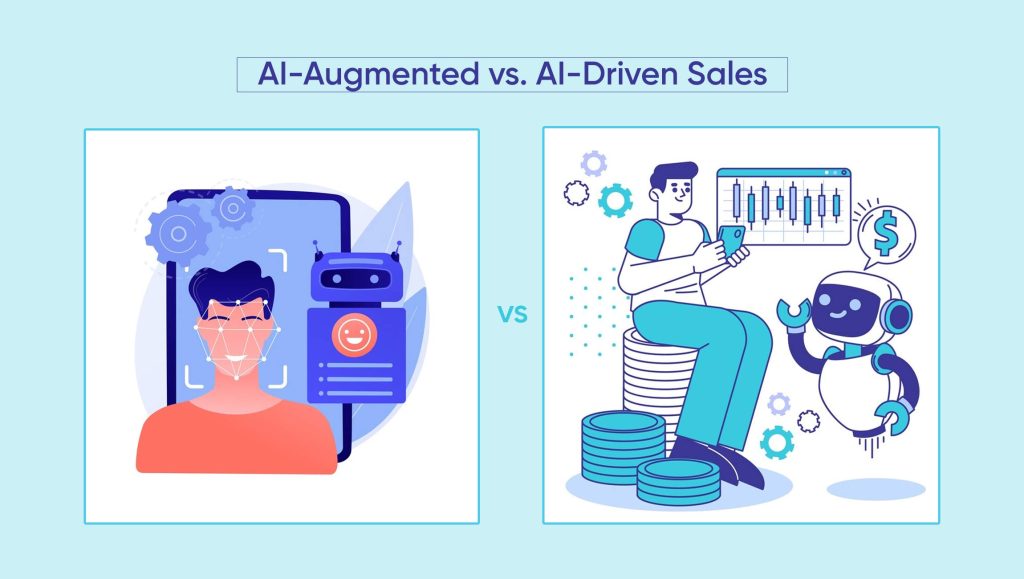In today’s increasingly tech-powered marketplace, the conversation around AI in sales has evolved far beyond automated email sequences. The current era is witnessing a fundamental shift toward fully AI-driven sales processes, sparking debates about whether machines will eventually run the entire sales show. This blog compares the key aspects of AI-augmented and AI-driven sales.
Understanding the Shift from Automation to Intelligence
Sales processes have transformed from mere automation to the era of AI-driven sales. While initial automation eased repetitive tasks, the evolution into intelligent systems now enables deeper insights, precision, and strategy. Over time, technology has shifted from managing mundane tasks to offering predictive analytics and strategic recommendations that enhance every step of the sales journey.
This transition reflects a broader shift in business culture. Organizations now view technology not as a replacement but as an enabler of more effective, data-backed decisions. The journey from automation to AI-driven sales represents a fundamental change in how companies approach customer engagement and revenue generation.
Reimagining Sales Teams Through AI Assistance
The progression from basic automation to comprehensive AI-driven sales is a journey marked by innovation and insight. These AI-powered helpers enhance efficiency by tackling repetitive tasks and offering data-driven insights.
-
Real-time Data Analysis:
AI platforms scan customer interactions and highlight promising leads.
-
Personalized Email Drafts:
Machine learning tools create tailored outreach messages that shorten response times.
-
Timely Meeting Scheduling:
Intelligent chatbots manage calendars and propose suitable slots to clients.
-
Intelligent Coaching:
Virtual assistants record calls, analyze sales conversations, and deliver constructive feedback.
The Emergence of Autonomous Deal Management
Autonomous deal management involves more than just scheduling follow-ups or sending invoices. It includes orchestrating every step of the customer journey, from early engagement to final closure.
Leading platforms can now:
- Identify Key Stakeholders by scanning organizational charts and social media connections.
- Craft Targeted Proposals using predictive modeling that aligns solutions with client needs.
- Adapt Communication Channels based on real-time customer engagement metrics.
- Coordinate Internal Teams for contract reviews, even executing approvals through integrated workflows.
Read More: SalesTechStar Interview with Bela Stepanova, Chief Product Officer at Apollo.io
AI’s Role in Holistic Customer Engagement
By analyzing browsing patterns and previous purchase behaviors, AI platforms can nurture leads with hyper-relevant content. These autonomous tools track user activity across multiple touchpoints, learning from interactions in real-time. As they gather insights, they craft personalized campaigns that resonate with specific segments and optimize follow-ups based on a buyer’s likelihood to convert. Through AI’s advanced pattern recognition, every lead interaction becomes an opportunity for deeper engagement, revealing why AI-driven sales models provide a robust edge for modern enterprises.
Negotiating in the Age of Intelligent Pricing
This stage moves beyond routine nurturing toward big-ticket elements. Let’s understand how dynamic pricing and AI-generated contract negotiation redefine the sales cycle.
-
Adaptive Price Points:
AI algorithms continuously monitor demand, competitor pricing, and buying signals to recommend optimal rates.
-
Automated Contract Drafting:
Natural language processing tools can produce initial agreements that minimize legal bottlenecks.
-
Risk Assessment:
AI quickly flags unfavorable contract terms and estimates the probability of disputes.
-
Real-Time Approvals:
Intelligent workflows integrate directly with CRM systems, eliminating manual handoffs.
Balancing Human Judgment with AI Driven Sales
The human-AI hybrid approach ensures that while AI handles data-intensive tasks, human intuition, empathy, and creativity drive relationship building and complex negotiations.
Key aspects of this approach include:
-
Empathetic Engagement:
Humans provide the emotional intelligence that AI currently lacks.
-
Strategic Oversight:
Sales leaders offer direction and context that guide AI recommendations.
-
Adaptive Learning:
Continuous feedback loops between human teams and AI systems enhance performance.
-
Relationship Building:
Personal rapport, trust, and nuanced negotiations are best handled by experienced sales professionals.
-
Hybrid Collaboration:
Seamless cooperation between AI and humans results in more informed, agile decision-making.
Preparing for a Fully Automated Sales Future
Before envisioning a world where machines might handle everything, it is vital to recognize potential hurdles. AI biases, data breaches, and loss of human intuition all pose risks. Yet rapid innovations suggest we may be closer to fully autonomous systems than many would believe.
Sales teams should maintain a strategic mindset. If tasks become automated, professionals can shift their focus to creative problem-solving. Rather than fearing job displacement, forward-thinking salespeople can align with AI-driven sales by mastering areas that require emotional intelligence or complex decision-making. This synergy creates a future where humans and AI collaborate rather than compete.
Practical Strategies for Smart AI Adoption
Here are some strategic moves that help sales leaders embrace AI while preserving genuine human connections.
-
Audit Your Processes:
Identify high-volume tasks that drain staff resources.
-
Invest in Training:
Educate teams to interpret AI insights more accurately.
-
Adopt Scalable Tools:
Select platforms that accommodate evolving data requirements.
-
Maintain Ethical Standards:
Ensure AI algorithms have transparent data usage and bias checks.
-
Monitor and Iterate:
Collect feedback from both customers and employees to fine-tune AI adoption.
Conclusion
While AI continues to stretch the boundaries of what’s possible, it may not fully replace human-led selling in the near term. However, AI driven sales practices will keep advancing, challenging businesses to decide how best to combine machine efficiency with the art of human connection. The winners in this new era are likely to be those who blend automated intelligence with empathetic, person-to-person engagement.
Read More: Sales Automation For Account-Based Selling: A Comprehensive and Strategic Approach





















